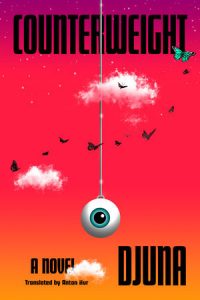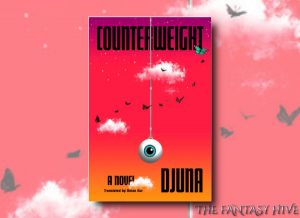COUNTERWEIGHT by Djuna, translated by Anton Hur (BOOK REVIEW)
“Behold, the fruits of fifteen years of labor. In the earlier days of the space elevator, a robot the size of a suitcase grabbed hold of a cable descending from the sky, then spent twenty-five days crawling up to orbital altitude. That same trip now takes only two days. Even without the kinds of things that SF writers like to imagine, such as linear motors. Once you start following the objectives set by people from the past, you’re bound to stumble upon a simpler, more convenient technology. When AI began participating in creative tasks, the speed of change and diversity of thought increased exponentially. President Han once said that the role of human beings, in the near future, would be to boost the machine civilization that’s on its way.”
Djuna is one of South Korea’s most important science fiction writers, having published ten short story collections and five novels and acted as chair of the Korean Science Fiction Writers Union, all without revealing any personal information such as age, gender or a real name. Counterweight, originally published in Korean in 2021, is their first novel to be published in English, translated by Anton Hur and published by Pantheon Books. On the strength of this novel, Djuna’s impressive reputation in South Korea is well earned, and I can only hope that this will herald more of their work being translated and published in English. Counterweight is a whip-smart post-cyberpunk novel set in the near future, centered on Earth’s first space elevator, the megacorp that built it, and the tiny island nation in the middle of nowhere that has suddenly become hot property because it is where the elevator is anchored. Djuna effortlessly combines smart speculation about near future technology and biting social satire about corporate hierarchies and corporations’ neocolonial ambitions. Counterweight is brisk and amusing, but at the same time grapples with an impressive number of thought-provoking and frightening ideas.
 Mac is the head of External Affairs, a group of gangsters and thugs now working as one of the security branches of LK, the Korean corporation responsible for constructing the world’s first space elevator, anchored on the fictional island of Patusan. He was hired by LK’s visionary President Han Junghyuk, but now that President Han is dead, possibly murdered by one of his rivals within the company, Mac is simply counting time until he is ousted by whoever takes control of LK next. Whilst chasing down terrorists in the Patrusan Liberation Front, Mac discovers that one of LK’s most unremarkable junior employees, Choi Gangwu, has links to the terrorists. In order to get a job with LK, Choi Gangwu had illegal biobots injected into his brain, and now may be harboring a Worm containing President Han’s memories, which could provide the key to taking control of LK, the space elevator, and the world’s fastest growing business. Soon, Mac and Choi Gangwu are in a race against time to locate the hidden stash containing the rest of President Han’s memories before they are found and claimed by any of their rivals – Ross Lee, LK’s interim head following the President’s death, Han Suhyun, President Han’s thuggish but ambitious son, Rex Tamaki, the brutal and dangerous head of LK’s Security Division and External Affairs’ biggest competitor, and Kim Jaein, the President’s beautiful niece who is the brains behind the entire space elevator project.
Mac is the head of External Affairs, a group of gangsters and thugs now working as one of the security branches of LK, the Korean corporation responsible for constructing the world’s first space elevator, anchored on the fictional island of Patusan. He was hired by LK’s visionary President Han Junghyuk, but now that President Han is dead, possibly murdered by one of his rivals within the company, Mac is simply counting time until he is ousted by whoever takes control of LK next. Whilst chasing down terrorists in the Patrusan Liberation Front, Mac discovers that one of LK’s most unremarkable junior employees, Choi Gangwu, has links to the terrorists. In order to get a job with LK, Choi Gangwu had illegal biobots injected into his brain, and now may be harboring a Worm containing President Han’s memories, which could provide the key to taking control of LK, the space elevator, and the world’s fastest growing business. Soon, Mac and Choi Gangwu are in a race against time to locate the hidden stash containing the rest of President Han’s memories before they are found and claimed by any of their rivals – Ross Lee, LK’s interim head following the President’s death, Han Suhyun, President Han’s thuggish but ambitious son, Rex Tamaki, the brutal and dangerous head of LK’s Security Division and External Affairs’ biggest competitor, and Kim Jaein, the President’s beautiful niece who is the brains behind the entire space elevator project.
Counterweight is set in the near future, and employs many cyberpunkish tropes, from the noir-ish thriller structure of its plot to the intrusive future technologies of Worms and biobots, ways of electronically interfacing with the human brain that become tools of social control. Its plausible and well-thought-out space elevator recalls the hard SF elements that shape much of cyberpunk’s attitude towards science and technology. But whereas much cyberpunk was fixated on the US and ideas and tropes of the Old West, Counterweight is thoroughly Korean in its concerns. Djuna is interested in engaging with and critiquing ideas relevant to modern South Korea and how the emerging technology is shaping its possible future. The spectre of AI, unsurprisingly, hangs heavily over the entire novel. In the dystopian future of Counterweight, the use of AI to run corporations and make decisions has further advanced from its worrying use in our present day, to the extent that humans are beginning to feel obsolete and unimportant in their own world, whilst everything is slowly coming under the holistic control of Ais that humans no longer truly understand. In this aspect alone, Counterweight is a thoroughly relevant and frightening book.
Counterweight is told entirely through Mac’s wonderfully sarcastic and world-weary narration. Mac is the perfect viewpoint character to introduce the reader to the novel’s world – he’s just close enough to the power games being played at the head of LK to know some of what’s going on and have a vested interest in the outcome, but Is jaded and cynical enough to enjoy revealing LK’s darker side and highly questionable ethics to the reader. Djuna is fascinated by the murky world of corporate politics, and the novel is highly critical of LK’s corporate neocolonialism. LK has bought up Patusan, which has gone from being a small island in the middle of nowhere to incredibly hot property because it’s where they space elevator anchors. LK, President Han and the other corporate interests have zero scruples about displacing the Patusan indigenous population, building their expensive new city literally on top of the ruins of the traditional Patisuan civilization, and covertly funding the Patusan Liberation Front as part of their agenda to control the local population. Both External Affairs and the Security Division are merely gangsters and local thugs hired and swallowed up by LK in order to strong-arm their way and protect their investments. Everyone from lowly workers like Choi Gangwu up to Mac himself are considered expendable, as soon as it becomes in the best interests of the company to cut them loose, have them killed or worse.
Djuna’s SF imagination is impressive, as is their sharp character work and tight plotting. Anton Hur does a wonderful job bringing the novel into English, capturing Djuna’s unique tone and satirical wit beautifully. From this one novel it’s easy to see why Djuna has the reputation they do in their native South Korea, and it is to be hoped that this will encourage more of their work to be made available to genre fiction readers in English.
Counterweight is available now. You can order your copy on Bookshop.org

